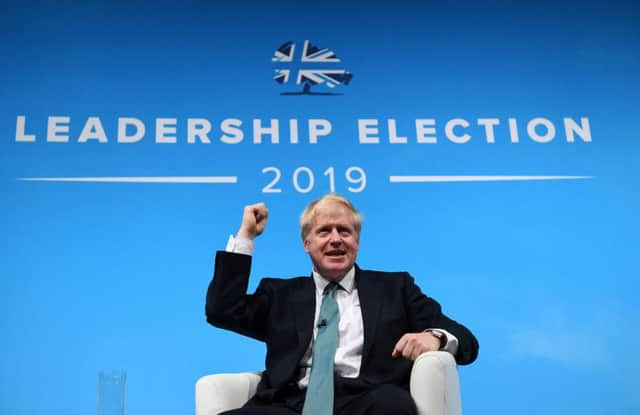The new Prime Minister must save lives by fixing the loan charge mess, say campaigners


Read more:
Advertisement
Hide AdAdvertisement
Hide AdMembers of the Loan Charge Action Group attended the hustings at the London Excel Centre, where Boris Johnson and Jeremy Hunt took part in the final leadership debate, in front of more than 2,000 Tory members.
In a tweet, the Loan Charge Action Group, said: “Thanks again to our wonderful Loan Charge Action Group members for turning up to the Conservative Hustings to let Boris Johnson and Jeremy Hunt know in no uncertain terms it’s time to fix this mess, sign the Loan Charge Pledge and save lives.”
A member of the group said on Twitter: “I spoke with a couple of MPs, an MP’s researcher, and a councillor. All were hugely supportive and very complimentary about the overall loan charge campaigning. Most felt that Boris would do something about it when he wins.
“A lot of Conservative members came out after the hustings and wanted to know more. Everyone I spoke to was very supportive. Some were business owners and felt that the loan charge is a dangerous precedent that must be stopped.”
Advertisement
Hide AdAdvertisement
Hide AdThe action group and the All-Party Parliamentary Group on the Loan Charge (APPG) argue that the charge is retrospective and overrides taxpayer protections - claims which have been disputed by the Treasury. Campaigners also say that it poses a threat to the mental health of thousands of people.
At a previous hustings event, Boris Johnson said of those affected by the loan charge: “It seems superficially unjust that they should be retrospectively pursued... they need an independent review”.
Jeremy Hunt has said he would look at the issue with sympathy and consider the facts before deciding whether to reverse the loan charge.
The loan charge was introduced in response to the Treasury’s concerns about “disguised remuneration schemes” which involved individuals being paid through loans, usually via an offshore trust in a low or no tax jurisdiction, which they did not have to repay.
Advertisement
Hide AdAdvertisement
Hide AdAccording to the Treasury, the loan charge means people paying themselves through loans will have to contribute their “fair share” to pay for our public services.
Workers from a wide range of professions - including locum doctors and nurses - have been hit with tax bills of up to tens of thousands of pounds dating back to 1999.
So far, 208 Parliamentarians - including 78 Conservative MPs - have signed an open letter to the Treasury calling for the suspension of the loan charge and an independent review.
A group of Conservative MPs has called on Mr Johnson and Mr Hunt to sign a pledge to suspend the loan charge and launch an official review if they become Prime Minister.
Advertisement
Hide AdAdvertisement
Hide AdDavid Davis MP, said: “The retrospective loan charge is absolutely wrong. The people affected by this policy are not wealthy city slickers, bankers or financial specialists.”
A Treasury report into the loan charge stated: “Despite the claims made by some promoters, HMRC does not and never has approved tax avoidance schemes... The Government is clear that the legislation is not retrospective. It applies a tax charge to outstanding DR (disguised remuneration) loan balances at 5 April 2019.
“It does not change the tax position of any previous year, the tax treatment of any historic transaction, or the outcome of any open compliance checks. The Government considers that the rationale for this charge is clear and robust, and has been consistently clear there is no intention to change the relevant legislation which has been enacted by Parliament.”
HMRC has stated that disguised remuneration loan schemes are a form of tax avoidance that have denied public services large amounts of revenue.
Advertisement
Hide AdAdvertisement
Hide AdA spokesman for HMRC said previously: “We have committed to giving people as long as they need to pay the loan charge as we completely understand that facing a large tax bill can be difficult and stressful.
“Our teams are trained to identify customers who are anxious, worried or need extra support and ensure they get the help they need.
The spokesman added: “If people are worried about being able to pay the loan charge, they should get in touch with HMRC as soon as possible by calling the dedicated HMRC helpline on 03000 599110.”